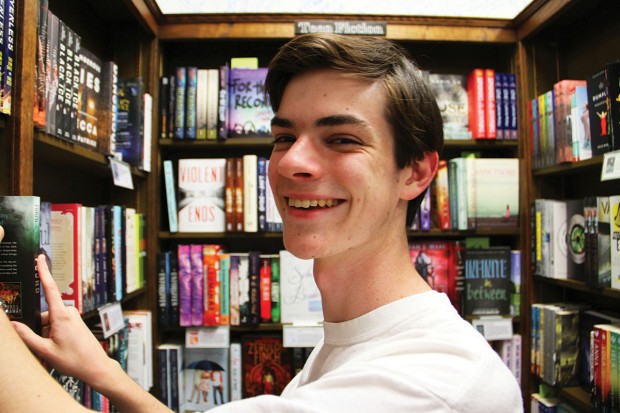First Jobs
Teens working part-time


Of his after-school job at Blue Willow Bookshop, Douglas Whitson says, “You learn, not just how to work at a bookshop, but how a business is run and how products are marketed.” (Photo: Blue Willow Bookshop)
The summer after graduating from Stratford High School, Grant Haralson got a job with Janus 1 Unlimited, a franchisee with 26 McDonald’s restaurants in Houston.
One of his tasks: playing Grimace, the purple milkshake character, including at professional baseball games.
“The costume’s hot, yes, but it’s fun to see people smile when they see me coming,” says Haralson, now a freshman at The University of Texas at Austin.
That first teenage job – flipping burgers, bagging groceries, scooping ice cream – is an experience fewer young people are having. According to the Pew Research Center, fewer than one-third of all American teens held a summer job in 2014. In 1978, almost two-thirds did. But working has value. According to Pew research, every year a person works as a teen results in a 14 to 16 percent increase in their income in their 20s.
One reason for the decline in teen employment: teens are busier, at school and with activities. At the same time, fewer can drive. According to a survey done by the AAA Foundation, only 54 percent of all American teens get their licenses before their 18th birthday.
While Douglas Whitson, a senior at Strake Jesuit, has worked at Blue Willow Bookshop since September, he says, “Out of my core group of friends, 10 guys, only one has a job, and one used to. The rest play sports.”
Teens in their first jobs learn what are known as “soft skills,” such as being on time and dressing and behaving professionally. Some employers of recent college grads say they’ve learned to look specifically for paying jobs on resumes. “Forget the fancy service trips and the extracurriculars,” says one. “We find that the ones who have worked know how to work.”
Mentoring teens can be satisfying. “It’s fun to watch them bloom,” says Debbie Adams, Haralson’s boss and mother of two young adults (both of whom worked as teens). Adams, who was an ER nurse before founding Janus 1, worked at a McDonald’s drive-through as a teen. “It was the very best training I could have had to be an ER nurse,” she remembers. “You were under pressure. You were essentially doing triage.”
Allison Goldberg encouraged her two girls, Jordan, 18, and Natalie, 16, to work in the summers. Jordan, now studying social work at UT, started working at the clothing retailer Vineyard Vines as a 10th grader. Natalie, a sophomore at Emery/Weiner School, works the front desk at Row, an exercise studio. “There’s just so much value in working,” says Allison. “I felt strongly that I wanted them to see how much work it takes to make minimum wage and what a rude customer or a kind customer looks like.”
What advice do employed teens, their bosses and their parents have for young job seekers?
Don’t just blanket a neighborhood with resumes. “Pick places that are interesting to you,” says Jordan Goldberg.
Whitson’s family has shopped at Blue Willow since he was small. Valerie Koehler, owner, advises, “Understand where you are applying.” She recommends visiting the business, as a customer. “Go get an ice cream at that ice-cream shop and observe,” she says. “You might even decide that you don’t want to work there.”
Allison Goldberg encouraged her daughters to research companies and come up with 3-5 questions to ask during the interview. The family also practiced answering interview questions casually, like when they were driving somewhere. Jordan confirms that the preparation did help.
Family support is great, but you have to apply alone. “Don’t have your mom pick up the application, don’t have her come in to ask questions, don’t have her come with you,” says Koehler, “and don’t bring a friend to the interview. We want to see that you are brave enough and independent enough to do this on your own.”
Don’t fret about looking nervous. Indeed, trying to act nonchalant can be the interview killer. “If someone is dressed nice and seems nervous, that is a good sign,” says Michael Savino of Michael’s Cookie Jar.
“Body language is important: Look the interviewer in the eye, have a firm handshake,” says Adams. “Be on time. Speak clearly. And leave your cell phone in your pocket.”
Don’t take no personally. Blue Willow “gets a ton of applications,” says Koehler. (And has no current openings.)
“I was nervous. They say a lot of things to you at the interview,” says Haralson. “A W-9? What’s that? But don’t worry. They help you. Smile, be polite, be yourself.”
Want more buzz like this? Sign up for our Morning Buzz emails.
To leave a comment, please log in or create an account with The Buzz Magazines, Disqus, Facebook, or Twitter. Or you may post as a guest.


